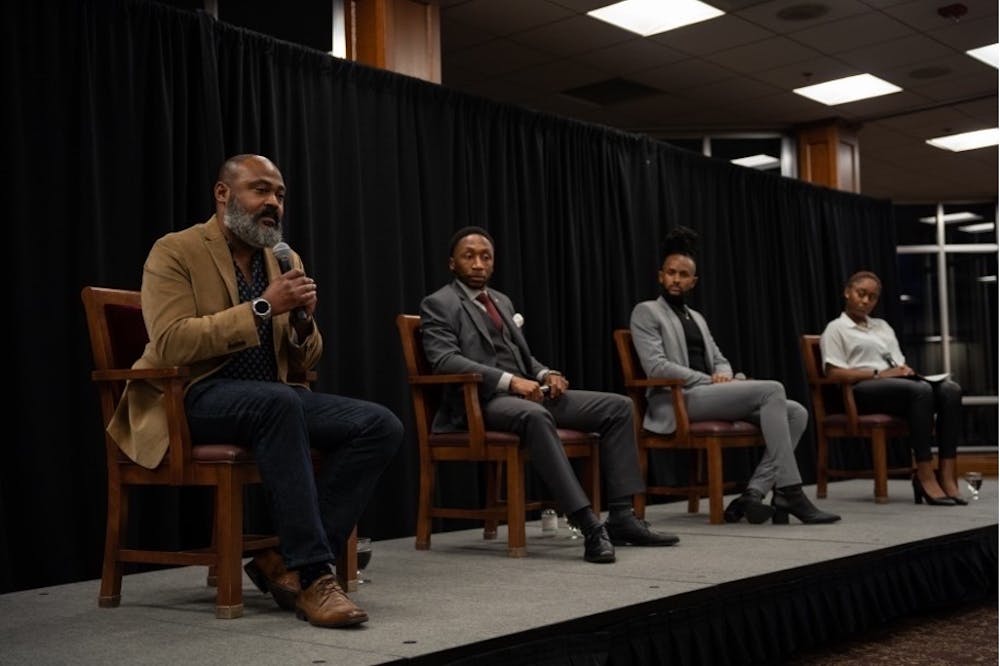IU Student Government and the Black Student Union led a panel event on the evolution of leadership Thursday. The panel discussion was directed by IU senior and BSU President Ariyonna Cousins. On the panel were four of the five Black student body presidents IU has had throughout its history.
According to their website, IUSG has served IU for more than 100 years since the first student council in 1912.
While the number of Black student body presidents has been small, the impact they have made on this campus has been remarkable.
From 1960 to 1961, Thomas I. Atkins served as the first Black student body president of IU and the first to serve in this capacity at any Big Ten School.
During his time as IU student body president, Atkins served as one of twelve members on the Board of Aeons and was IU’s first student to receive the U.S. Experiment in International Living grant.
Related: [Black Voices: Black fraternities and how they benefit universities]
Atkins created a legacy which has a lasting effect to this day as a living-learning center was created in his honor.
Keith Parker was the IU student body president from 1970 to 1971 and helped form the African studies program at IU.
While serving as student body president, Parker was also a member of the Black Panther party and helped create food banks and daycare centers on the IU campus.
As student body president, Parker did not have it easy in his role and said his biggest challenge was surviving.
“Our primary issue which was a nationwide issue at this time was recognizing not only did students have a voice but they had a right to have a voice,” Parker said. “We raised hell.”
From 1999 to 2000, La’Maze Johnson served as the third Black student body president nearly 30 years after the last Black student body president was sworn in.
Johnson prides himself and his administration on the completion of the campus bus service which was a challenge before his term.
Related: [Ask Black Voices: What is being in a relationship like for a college student?]
Johnson said he would do his presidential experience all over again and enjoyed his time in his role.
“You create your own opportunity,” Johnson said.“I did not wait for anybody to permit me to pursue the goals I set for myself. I just went and grabbed them.”
Johnson was convinced by white students to run for student body president and felt he could best represent them.
After Johnson came Michael Coleman. Coleman served as IU student body president from 2010 to 2011 and his administration worked on several campus resources which are still in existence to this day.
Coleman and his administration pride themselves on the achievement of DoubleMap and fall break.
“We were using cellphones just so we could GPS track the buses so you could know where the bus was based on where the phone was,” Coleman said.
Coleman said one of the struggles of diverse leadership lies in economics.
“As executives, we would get $3,000 - $4,000 a year,” Coleman said. “Being a Groups student and with my parents never going to college, I was supposed to be the successful one coming out of college. For me to say I would not accept the stipend did not seem like a possibility.”
Related: [Black Voices: Where’s the IMU Bookstore’s Black History Month section?]
Our current student body president, Ky Freeman, connects all of the past presidents in a way in which their legacy continues through him.
Freeman’s administration is working on increasing the safety of the campus mostly through sexual assault awareness as well as in the realm of diversity, equity and inclusion.
“My biggest accomplishment has been this message of radical love even in the moments when people have not loved me back,” Freeman said. “I naturally want to protect people and in that protection, it is making sure I face the brunt of it so others do not.”
Freeman has used his voice and administration to bridge the gap between the many lived experiences of the diverse people who represent all spectrums of the world at IU.
Black history at IU is quite rich, is not monolithic and is collectively powerful.



